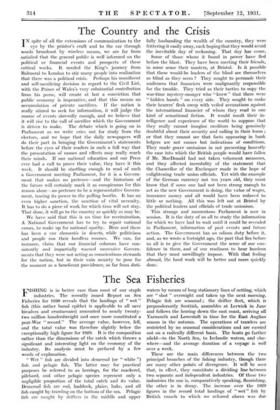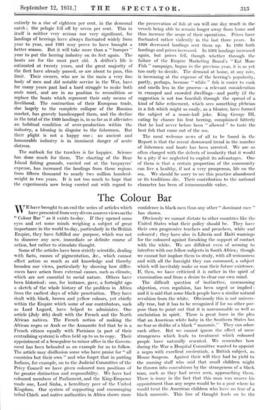The Sea Fisheries
FISHING is in better case than most of our staple industries. The recently issued Report on Sea Fisheries for 1930 reveals that the landings of " wet " fish (this rather banal epithet is applicable to all save bivalves and crustaceans) amounted to nearly twenty- two million hundredweight and once more constituted a post-War " record." The average value, however, fell, and the total value was therefore slightly below the exceptionally high figure for 1929. It is the composition rather than the dimensions of the catch which throws a significant and interesting light on the economy of the industry. Its analysis must be prefaced by a few words of explanation.
" Wet " fish are divided into demersal (or " white ") fish and pelagic fish. The latter may for practical purposes be referred to as herrings, for the mackerel, pilchard, and other pelagic species represent only a negligible proportion of the total catch and its value. Demersal fish are cod, haddock, plaice, hake, and all fish caught by trawling on the bottom of the sea. Pelagic fish are caught by drifters in the middle and upper waters by means of long stationary lines of netting, which are " shot " overnight and taken up the next morning. Pelagic fish are seasonal ; the drifter fleet, which is preponderantly Scottish, assembles at Lerwick in June and follows the herring down the east coast, arriving off Yarmouth and Lowestoft in time for the East Anglian season in the autumn. The operations of trawlers are restricted by no seasonal considerations and are carried out on a radically different basis. The boats go farther afield—to the North Sea, to Icelandic waters, and else- where—and the average duration of a voyage is well over a week.
These are the main differences between the two principal branches of the fishing industry, though there are many other points of divergence. It will be seen that, in effect, they constitute a dividing line between two separate and independent industries. Of these two industries the one is, comparatively speaking, flourishing, the other is in decay. The increase over the 1929 figures in the record total landings of " wet " fish by British vessels to which we referred above was due entirely to a rise of eighteen per cent. in the demersal catch ; the pelagic fell off by seven per cent. This in itself is neither very serious nor very significant, for landings of herrings have always fluctuated widely from year to year, and 1931 may prove to have brought a better season. But it will take more than a " bumper " year to put the herring industry on its feet again. The boats are for the most part old. A drifter's life is estimated at twenty years, and the great majority of the fleet have already passed, or are about to pass, this limit. Their owners, who are in the main a very fine body of men and did notable service in the War, have for many years past had a hard struggle to make both ends meet, and are in no position to recondition or replace the boats which represent their only means of livelihood. The contraction of their European trade, due largely to the complete collapse of the Russian market, has gravely handicapped them, and the decline in the total of the 1930 landings is, in so far as it alleviates an habitual condition of over-production within the industry, a blessing in disguise to the fishermen. But their plight is not a happy one ; an ancient and honourable industry is in imminent danger of acute distress.
The outlook for the trawlers is far happier. Science has done much for them. The charting of the Bear Island fishing grounds, carried out at the taxpayers' expense, has increased the landings from those regions from fifteen thousand to nearly two million hundred- weight in two years. It is not too much to hope that the experiments now being carried out with regard to the preservation of fish at sea will one day result in the vessels being able to remain longer away from home and thus increase the scope of their operations. Prices have fluctuated rather violently in the last three years. In 1928 decreased landings sent them up. In 1980 both landings and prices increased. In 1931 landings increased again, but prices fell, though whether through the failure of the Empire Marketing Board's " Eat More Fish " campaign, begun in the previous year, it is as yet too early to decide. The demand at home, at any rate, is increasing at the expense of the herring's popularity, partly, perhaps, because " white " fish is easier to cook and smells less in the process—a relevant consideration in cramped and crowded dwellings—and partly (if the suggestion is not too fanciful) through the spread of a kind of false refinement, which sees something plebeian in a fish which might so easily, as a bloater, have formed the subject of a music-hall joke. King George III, eating by chance his first herring, complained bitterly that he had never before been " allowed " to taste the best fish that came out of the sea.
The most welcome news of all to be found in the Report is that the recent downward trend in the number of fishermen and boats has been arrested. We are so often charged with the defects of insularity that it would be a pity if we neglected to exploit its advantages. One of them is that a certain proportion of the community can live a healthy, if not a very prosperous, life on the sea. We should be sorry to see this practice abandoned or its traditions die. Their contribution to the national character has been of immeasurable value.































 Previous page
Previous page